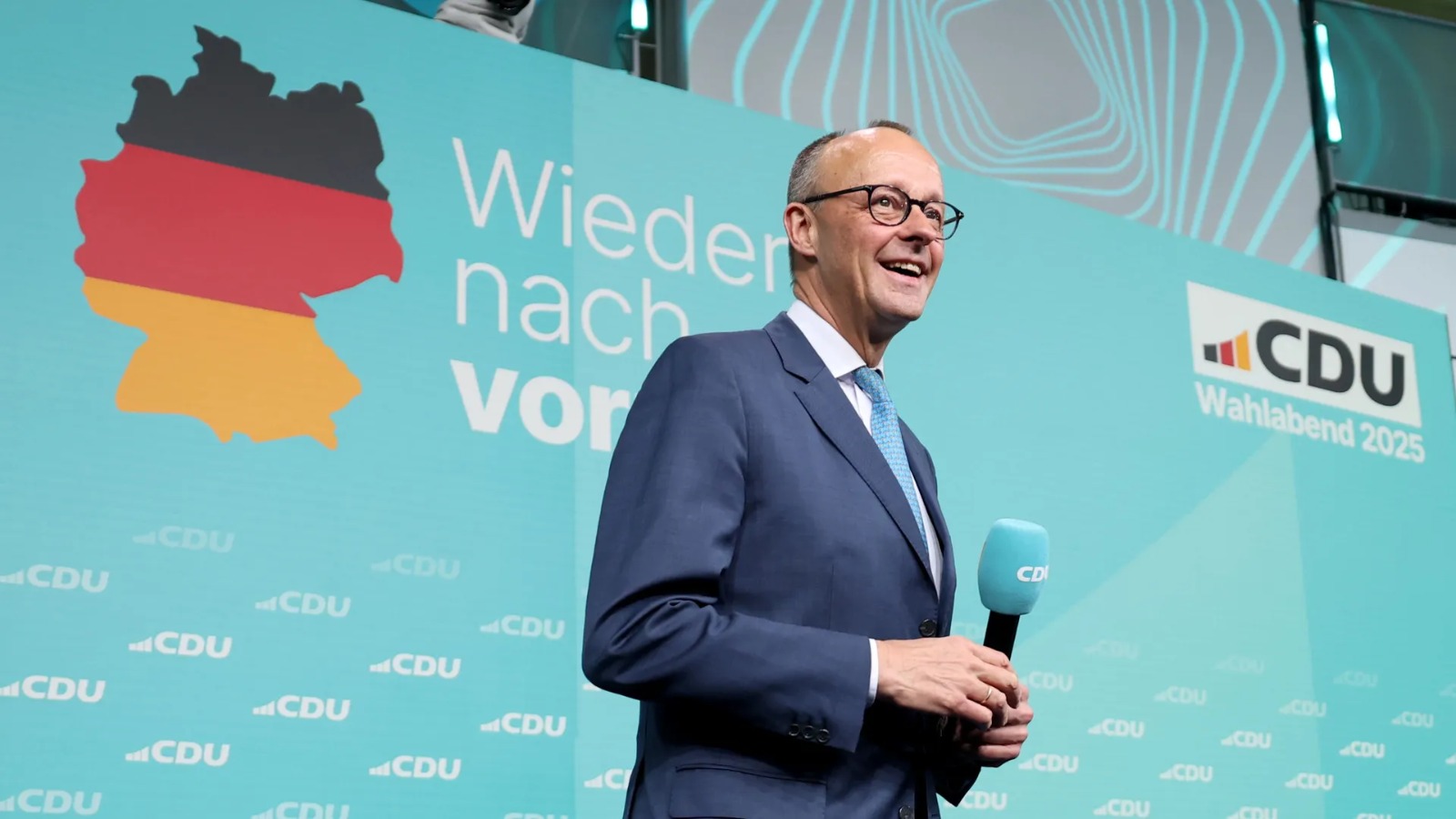Friedrich Merz, the leader of the German Christian Democratic Union (CDU), issued a warning to Europe:
Independence from the United States. The statement follows CDU’s recent victory in German elections. In this election, 20% of European independence demand comes in second place, as Germany’s Right-wing Extremists (AFD) party is in historic second place. From the US, this is an important development, especially considering the long-term alliance between the two companies. However, Meltz’s attitude has not been so surprising given the increasingly tense relationship between Europe and the United States in recent years. In particular, the strong representation of the AFD has expressed concern about the growing influence of right-wing extremist ideologies in Europe. Meltz excludes forming a coalition government with the AFD, but the party’s increasing popularity cannot be denied. You will always be unable to trust us as a partner.
The Trump government’s “America First” guidelines, coupled with the US withdrawal from various international agreements and organizations, create uncertainty and tension in transatlantic relations. European autonomy andl self-confidence face growing global uncertainty. It is still unclear how this actually works, but one thing is clear. The relationship between Europe and America enters a new era of complexity and tension. Mertz’s warnings have a major impact on Europe, particularly with regard to economic and security relations with the United States. A more independent Europe will likely diversify its economic partnerships and reduce its trust in the US.
America for protection:
This includes increasing investment in European defense initiatives such as the European Defense Fund. That European ally is more independent Europe probably doesn’t want to follow US control over various international questions and instead tries to find their interests and priorities. When the United States is trying to maintain its traditional leadership role in transatlantic relations. However, it also creates opportunities for the US and Europe to develop more equal and balanced partnerships based on mutual respect and cooperation. The United States is a key development in transatlantic relations. This reflects Europe’s desire to assert autonomy and personal responsibility given growing concerns about US reliability and reliability as a partner and growing global uncertainty.
A new era of complexity and tension as a relation between Europe and the United States. It is still unclear how Merz will actually play for European independence. But one thing is clear. The future of transatlantic relations is shaped by the interaction of complex factors, including economic and security interests, cultural and historical connections, and competing visions for the future of the international order.
German elections are not only important events for the country, but also important events for the European Union and the international community. As Germany is Europe’s largest economy and one of the most politically influential countries, election results often have far more important consequences for economic policy, international relations and stability of the European Union. It reflects many developmental dynamics in German politics. These elections represent important moments in the country’s history, but they navigate to change political alliances, new social challenges, and changing voter expectations. The election also marked the end of the era with the departure of Chancellor Angela Merkel, who led the country for over 16 years. Understanding the most important snack bars from German elections gives us insight into the future of the country and broader geopolitical trends.
End of the Merkel Era and the New Political Landscape:
Angela Merkel’s departure at the head of Germany 16 years later was a historical change in the country’s political landscape. Merkel’s leadership has long been characterized by pragmatism, stability and gentle behavior during the crisis. Their impact was particularly pronounced during the eurozone debt crisis, the 2015 immigration crisis, and the Covid 19 pandemic that positioned Germany as a stable force in Europe.
Merkel’s absence opened the door for new leadership, which led to an era of uncertainty and transition in German politics. In particular, the 2021 election showed the party’s development around political maturity and the power of voters. As soon as the German government’s backbone suffers from internal divisions and leadership issues, Merkel heads as the CDU/CSU coalition for most of her term. The SPD, a German social democrat, discovered a revival under the leadership of Olaf Scholz, which was carried out on a platform of progressivism and continuity. The elections demonstrated a shift in Merkel’s centrally progressive and social democratic status, with SP achieving an important foundation. Idea and leadership style. This has created a more dynamic and competitive political environment that demonstrates potential changes in German domestic politics, including a strong focus on climate change, economic inequality, and a social justice.
The rise of the Social Democrats (SPD) and transition to the left:
One of the most important snack bars from the latest elections in Germany was the revival of the Social Democrats (SPD). Under the leadership of Olaf Scholz, SPD became the biggest party in the Bundestag in 2021. This was a dramatic change in the SPD, which had been largely hidden by the CDU for many years, and successfully positioned as a voice of progressive change. The S-Campaign used key topics such as climate protection, social justice and fighting economic inequality. SPD’s commitment to combat climate change and promoting social welfare seen in people who are located in the growing gap between younger voters and wealth. With the support of the Greens and the Liberal Democrats (FDP), Scorts were able to form a cable coalition , Left wing forces. This trend follows the growing popularity of left-wing guidelines that address the needs of population groups in need of protection and are committed to more ambitious climate targets. Foreign policy, particularly with Europe. The SPD is expected to prioritize European integration, close cooperation with France and stronger attitudes towards climate diplomacy.
The Greens as Kingmakers and the Green Revolution in German Politics Another important success from the German election was the growing influence of the Green Party. The Greens didn’t get enough seats to form their own government, but she put them in a significant position as Kingmakers. This was a critical feature of political development with a focus on climate management, sustainable development and social justice. The rise of greens reflects growing public concern over environmental issues and a desire for key political measures against climate change. Sustainability, energy transition and green innovation are likely to be centrally important to Germany’s political agenda in the coming years. The impact of green within the government is expected to encourage stricter environmental regulations, increased investment in renewable energy and greater support for green technology. These goals coincide with the broader ambitions of the European Union and become carbon neutral by 2050. Discussion the party’s success in Germany shows that environmental policy plays an important role in the political future not only in Germany but across Europe.
The alternative to the V. Right-wing nationalist party Germany (AFD) was the third largest party in the previous election and maintained a strong presence with the moderator, continuing to have a major impact. The AFD used growing dissatisfaction with immigration policy, a sense of national identity, and disillusionment in political establishment. Use economic uncertainty, immigration concerns, and frustration with traditional elites. However, the AFD’s controversial rhetoric and radicalism led to alarms across Germany, where there is a strong commitment to the fight against democratic values and right-wing extremism. While testing the resistance and public commitment for pluralism and tolerance of German democracy, the state’s political institutions. They also address underlying symptoms that encourage right-wing extremists, such as traditional parties, such as CDUs, that are concerned with voters who feel marginalized by globalization, immigration and cultural change governments. It raises questions about the need to find a way to do this. Time protects Germany’s democratic values.
More Complex Union Policy: “The Need for Compromise”
The 2021 election results have increased the importance of German Union Policy. The need for cooperation between several parties to form a government has become an increasingly dominant feature of German politsuc. The rise of smaller parties, such as the Greens and the Liberal Democrats (FDP), has made it even more difficult for the parties to form a majority and create a more fragmented political landscape. It followed the 2021 election, known as the “Rotor Signal Coalition” between the SPD, Greens and FDP, which was the first to be known as the “Rotor Signal Coalition. ” Coalition negotiations included intensive discussions about political compromises on questions such as climate change, taxation, digitalization, and social wells. This process reflects the increasingly complex nature of German politics, with the priority of small parties having to be reconciled with larger parties. This ensures a broader representation of profits, but this can also delay decision-making and create government challenges. The need for compromise in coalition policies is likely to remain a critical feature of the German political system for years to come, as electors continue to move towards more diverse and fragmented political preferences.
The growth trends of the German Union government highlight the increasing complexity of governments within the country. It suggests that a single party can unilaterally push its agenda, suggesting that building consensus is extremely important for the future design of the country. Germany and internationally. The end of Angela Merkel’s leadership opened the door to a new political dynamic. The rise of right-winged extremists presents a challenge to German democratic values that require vigilance and continued commitment to combat the symptoms of dissatisfied voters. The country must deal with a more complex political environment to harmonize the priorities of various political parties, while simultaneously maintaining stability and promoting economic growth. Given climate change, social justice and economic inequality, Germany’s future is defined by how these challenges are addressed by the state’s political leaders and institutions. As Europe’s major economic and political forces, there will be a deeper influence on the European Union and a more comprehensive global order.




